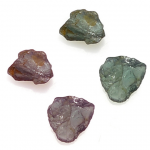 As a set, Garnet gemstones are a relatively common prevalence that forms in relatively metamorphosed rocks and igneous formations below extremely high pressure and temperatures. Today, the main supplier of color trade Garnet is East Africa, mainly the Umba Valley in Tanzania. Different incredible sources include Sri Lanka (Ceylon), Madagascar, Norway, Tunduru and the USA - Color Change Garnet
As a set, Garnet gemstones are a relatively common prevalence that forms in relatively metamorphosed rocks and igneous formations below extremely high pressure and temperatures. Today, the main supplier of color trade Garnet is East Africa, mainly the Umba Valley in Tanzania. Different incredible sources include Sri Lanka (Ceylon), Madagascar, Norway, Tunduru and the USA - Color Change Garnet
Coloration trade Garnet from East Africa is normally a combination of spessartite, grossularite and ranging ratios of almandine or pyrope. The Color-Change is usually greenish-yellow to brown under transmitted fluorescent mild and purplish-crimson under pondered fluorescent mild; under incandescent mild the shade shifts from reddish-orange to purple. Spessartite-grossular-pyrope specimens usually seem light bluish-green under transmitted fluorescent mild and violet-pink below meditated fluorescent mild; beneath incandescent light, the color shifts from light-pink to purplish-red.
 Sri Lanka (Ceylon) is thought to provide the best material which shifts from blue, inexperienced or grayish (daylight) to reddish-purple (incandescent light).
Sri Lanka (Ceylon) is thought to provide the best material which shifts from blue, inexperienced or grayish (daylight) to reddish-purple (incandescent light).
Some of the greatest shade alternate Garnets are mined from Bekily in Southern Madagascar. This best material is thought to show off a completely strong shade trade from greenish-brown to red-red. A few may also showcase numerous sunglasses of orange – Color Change Garnet
The US’s Color Change Garnet from Idaho is usually a mix of almandine and pyrope Garnet through composition. That is famed for its red to purplish-purple change.
Norway is thought to produce a coloration Change Garnet which shifts strongly from violet (sunlight hours) to claret (incandescent mild) and violet-crimson to blue-green. The crystals from Norway are usually quite small; often weighing much less than 1 carat, however, they’re prized because of their alexandrite-like depth of color alternative – Color Change Garnet
No comments:
Post a Comment